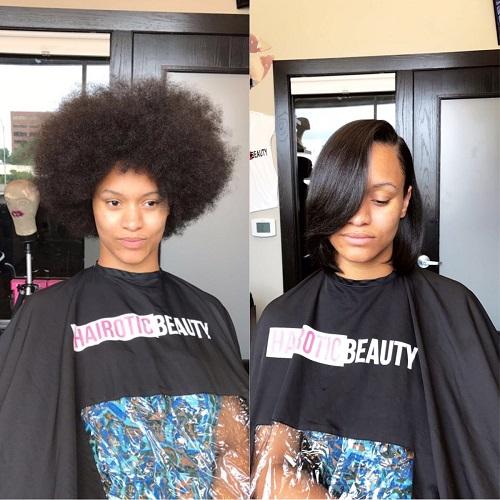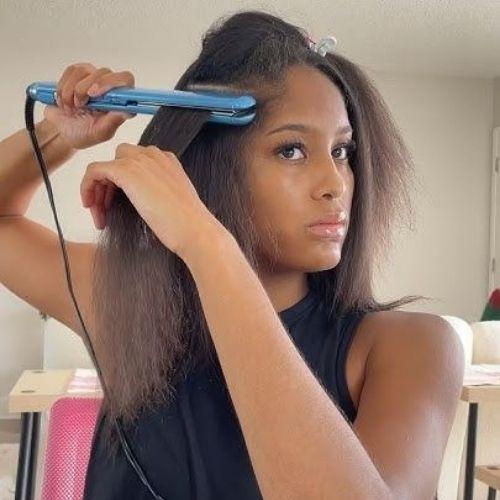
Silk Press vs. Flat Iron: What's the Real Difference?
Let’s be honest—silk press and flat iron sound like the same thing, right? They both give you straight hair, use heat, and leave you feelin’ like that girl. But hold up—they’re not the same. Whether you’re going for laid and flowy or just a quick frizz fix, knowing the difference matters. So, what’s the real tea on silk press vs. flat iron? Let’s get into it. 🔥💁♀️
What Is a Silk Press for Hair?

Image source: Pinterest
A silk press is a heat-straightening technique designed for natural hair, particularly tighter curl patterns (3C-4C), that delivers a sleek, silky appearance with movement, shine, and softness, without the use of chemicals.
How Does a Silk Press Work?
1️⃣ The Wash & Deep Condition: Start with a clarifying shampoo and a heavy-duty moisturizing treatment. Hydration is crucial.
2️⃣ The Tension Blowout: Using a blow-dryer and a round brush, the stylist stretches and smooths the hair while drying it. This creates a straight base and reduces direct heat exposure later.
3️⃣ The Press: Finally, a professional flat iron (ceramic or tourmaline) on medium heat glides through small sections in one smooth pass. This seals the cuticle for shine and minimizes damage. A heat protectant serum or light oil gives that glossy finish.
Pros and Cons of Silk Press
Pros of Silk Press:
✅ Next-Level Smoothness & Shine: That iconic glass-like finish? Chef's kiss.
✅ Longer Lasting: Can easily last 1-2 weeks, sometimes longer.
✅ Healthier Results (When Done Right): Lower heat + professional skill = less potential damage.
✅Reduced Frizz & Reversion: Holds up better against humidity than a DIY job.
✅ Hair Looks & Feels Amazing: It's a whole vibe.
Cons of Silk Press:
❌ Cost: It's a salon service, so it's higher compared to DIY.
❌ Time Commitment: Can take several hours. Patience is key!
❌ Skill Dependent: Results heavily rely on finding a stylist who truly knows the technique. A bad one = damage the city.
❌ Not Really DIY: This isn't your bedroom-mirror maneuver.
What is a Flat Iron for Hair?

Image source: Pinterest
This one's simpler. A flat iron (or straightener) is the tool itself – those heated plates with a hinge you clamp over a section of hair to smooth it out. You can buy one anywhere (Target, Ulta, Amazon, your cousin's bathroom).
How Does A Flat Iron Work?
Typically involves washing, blow-drying your hair yourself (maybe not as meticulously as a silk press prep), and then sectioning and clamping the iron down on each section, gliding it slowly from root to tip. It's the classic DIY straightening method.
Benefits and Drawbacks of Flat Iron
Benefits of Flat Iron
✅ Convenience: Do it yourself, anytime, at home.
✅ Cost-Effective (Initially): Just the price of the tool ($20 - $250+). No recurring salon fees for the service.
✅ Speed: With practice, hair straightening can be a faster alternative to a full silk press.
✅ Versatility: Many irons feature adjustable heat settings and can create curls or waves.
Drawbacks of Flat Iron:
❌ Higher Damage Risk: Using excessive heat, overworking sections, or skipping blow-drying can cause dryness, breakage, and fried ends. Ouch.
❌ Shorter Lasting: Silk presses often lose smoothness and puff up quickly, sometimes within days, especially in humid conditions.
❌ Skill Curve: Smooth, frizz-free results take practice; mistakes are possible.
❌ Less Polished Finish: Often lacks the incredibly high-shine, glass-like finish of a professional silk press.
Key Differences Between Silk Press and Flat Iron
Let's make it crystal clear:
1️⃣ It's a PROCESS vs. It's a TOOL: This is the biggest one! A Silk Press is a specific, multi-step technique (wash, blow-dry with tension, then flat iron). Flat Ironing is simply using the tool (often on already dry hair).
2️⃣ Primary Target Audience: Silk Press is specifically designed and optimized for natural, textured hair (Types 3 & 4). Flat ironing is used on all hair types.
3️⃣ Heat Application: Silk Press minimizes direct flat iron heat by relying heavily on tension blow-drying first, often using lower iron temps. Flat ironing applies direct heat immediately, often at higher temps.
4️⃣ Result: Silk Press aims for lightweight, bouncy, silky movement with high shine. Flat ironing can achieve smoothness but often risks looking flatter, stiffer, or less "alive," especially without perfect technique.
5️⃣ Longevity: A professional silk press generally lasts significantly longer and withstands humidity better than a typical at-home flat iron session.
6️⃣ Damage Potential: The silk press process, when done correctly, is designed to be less damaging to textured hair than frequent direct high-heat flat ironing without proper prep.
Conclusion: Which One Should You Choose?
For a temporary switch from natural curls to straight, bouncy hair, a silk press is ideal, preserving your texture. For a quicker, at-home straightening option, use a flat iron. Regardless of method, always use heat protectant. 🔥❤️🔥